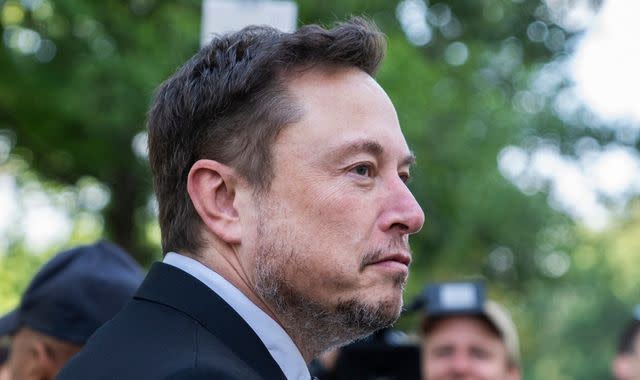Elon Musk refuses to answer if his 'ignorance and ego' cost Ukrainian lives

Billionaire Elon Musk has refused to answer Sky News questions about claims he foiled a Ukrainian attack on Russian warships.
The businessman behind SpaceX and X, formerly known as Twitter, has been accused of enabling Vladimir Putin by withholding the use of his satellite network.
Ukrainian military forces planned to use the Starlink satellites for a drone attack on a Russian naval base last September, but Musk wouldn't allow it.
War stakes 'raised' by Crimea attack - latest updates
Ukraine has relied heavily on the Starlink network, owned by the billionaire, since Russia's 2022 invasion.
Details of permission being withheld have emerged in a new biography of Musk.
The Russian vessels in question were stationed at Sevastopol in Crimea, the Ukrainian territory annexed by the Russians in 2014.
Musk had posted on X: "If I had agreed to their request, then SpaceX would be explicitly complicit in a major act of war and conflict escalation."
A senior Ukrainian war official has accused him of causing the deaths of civilians by denying access to his satellites.
Mykhailo Podolyak, a senior adviser to President Volodymyr Zelenskyy, tweeted: "Civilians, children are being killed. This is the price of a cocktail of ignorance and big ego."
Sky News asked Musk about the Ukrainian's remarks after he had attended a meeting at the Federal Aviation Authority in Washington DC.
He declined to answer when asked if his ignorance and ego had cost Ukrainian lives.
Nor did he respond when asked if he appreciated the description of him by Mr Putin as "outstanding".
Musk had earlier attended a meeting on Capitol Hill with US senators.
Read more:
Musk's Starlink intervention could be worrying sign of things to come
World 'nowhere close' to existential AI threat
He pulled up in a Tesla, of course he did.
Musk arrived on-brand, squeezed with his security detail into the back seat of a Tesla vehicle, as sold by the man himself.
It was the marketing necessity (his arrival was filmed by the world's media) that contrasted him with platinum-class contemporaries.
Size mattered more to the likes of Mark Zuckerberg as they rolled in presidential-style SUVs towards a conference in the heart of DC.
And they were all there - the guest list read like a Who's Who in artificial intelligence (AI), gathering to be quizzed on where their technology might take our world.
It was a closed-door meeting with US senators gathered around a U-shaped table.
For the tech billionaires, there were questions from the media on their way into the building but little came back, save for the faint whiff of fragrance from a procession of the expensively underdressed.
Their inner thoughts were clearly reserved for the politicians probing AI, its benefits, dangers and requisite protections.
Together, the tech giants behind Microsoft, Meta, X et al hold considerable power over the future and, of course, their influence stretches far in the present.
On the day, we didn't hear the latest thoughts of Musk on the controversy embroiling him and Ukraine.
Maybe the politicians looking into artificial intelligence, its power and reach, had better luck?
Even if they didn't, even in silence, the surrounding noise makes one thing abundantly clear.
The ability of AI and its owner to shape armed conflict reflects its power to change the rules of engagement - on the battlefield and far beyond.


